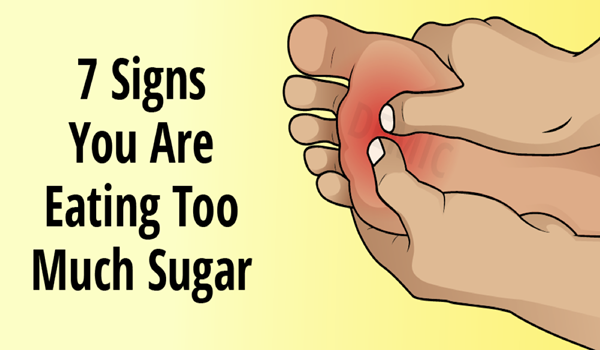Everybody loves the sweet taste of sugar. However, life is unfair, so sugar, especially in high amounts, is extremely bad for one’s overall health. When you read the ways sugar can affect your health, it is most likely that you won’t look at it the same way – although its taste will always remain delicious.
Here are 7 indicators that will help you realize if your sugar intake has gone overboard, and that it’s time to take better control of it:
1. Lack of Energy and Feeling TiredIt is well known that foods high in sugar provide a temporary energy boost. However, there is always an inevitable crash afterward, where you just don’t have the energy to do the necessary tasks throughout the day. If you experience this, you might want to check on your sugar intake.
2. Sugar/Carb CravingsRegular sugar cravings can be an indicator that you have become a sugar addict. Sugar is very addictive, and its intake can create a chain reaction of sugar cravings. If you’re experiencing these cravings, you should immediately try to take control of it.
3. Frequent Colds and FluOn the long run, frequent consumption of sugar can lead to a weakening of the immune system, decreasing its ability to fight off flu, viruses, colds, bacteria, and even chronic diseases. Cutting sugary foods from your diet can restore your immune system balance.
4. Foggy Brain, Especially After a MealHigh sugar intake is associated with what is called Brain Fog. It is a condition that can easily rob you of inspiration and happiness, while increasing the likelihood of symptoms of anxiety and depression. Brain fog occurs after consuming a lot of sugar, which rapidly increases, and then drops the blood sugar levels.
5. Not the Same Sweet Taste as BeforeResearch shows that increased sugar intake will bombard your taste buds to the point where their reception of sugar will change. This means that you will need more and more sugar to satisfy your cravings. The solution in such a case is to reduce your sugar intake and suffer through the short withdrawal period until your body becomes used to less sugar. Over time, you might even start feeling certain things are too sweet for you, and thus be content with a moderate amount of sugar.
6. Problems With Your Skin and Feet, Dark Undereye CirclesIt is a fact that sugar has inflammatory effects, and too much consumption of sugar can manifest in the forms of skin issues. It might be the cause of your rosacea, acne, eczema, or even excessive dryness or oiliness. Additionally, high sugar intake can have a negative effect on your adrenaline levels, causing a so-called adrenaline fatigue – which also leads to the creation of dark circles under the eyes.
A podiatrist in New York City, Dr. Sherri Greene, explains that sugar can also have an inflammatory effect on our feet – which might result in plantar fasciitis. This is one of the main causes of pain in the thick band of tissue on your soles, or heels.
7. Weight GainGiven its structure, offering no protein or fiber, sugar is unable to keep us full. Sugar is only filled with often useless, high amounts of calories. It also stimulates the production and mobilization of insulin, which is in charge of carrying the sugar to the organs where it used as energy. Too much sugar leads to too much insulin production, which in the end can create insulin resistance. This disables the body from reacting properly to normal quantities of insulin and cannot manage sugar as it should. Insulin resistance is closely associated with obesity so it is very easy in such situations to add weight. Worst case scenario is developing diabetes, leaving your pancreas working in overdrive all the time.
Have you found yourself in any of these situations? Maybe it’s time to finally do something! As a starting point, try to lose your weight and feel better.



